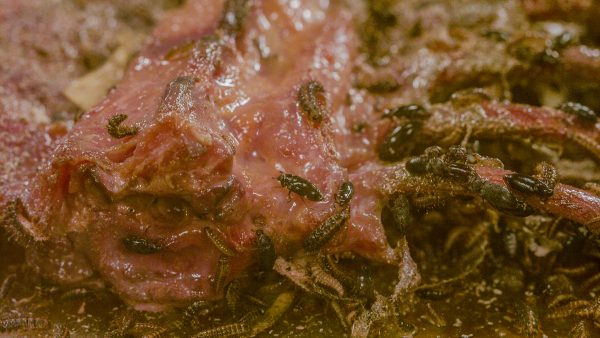Decomposer Definition
Decomposers are living things that break down dead things. For example, worms decompose dead plants into soil nutrients.
View Lesson on Food Webs: Cycling of Matter & Flow of Energy
Become a member to get full access to our entire library of learning videos, reading material, quiz games, simple DIY activities & more.
Become a member to get full access to our entire library of learning videos, quiz games, & more.
Plans & Pricingto watch this full video.

Access All Videos
and Lessons, No Limits.
Access All Videos

No credit card required,
takes 7 sec to signup.
No card required

Ready-to-go lessons
that save you time.
Ready-to-go lessons
If you are on a school computer or network, ask your tech person to whitelist these URLs:
*.wistia.com, fast.wistia.com, fast.wistia.net, embedwistia-a.akamaihd.net
Sometimes a simple refresh solves this issue. If you need further help, contact us.
Food Webs: Cycling of Matter & Flow of Energy
Fun Facts
- Decomposers like maggots break down dead matter into carbon dioxide and water.
- Flesh-eating beetles are decomposers that eat dead flesh off bones.
- Yeast, a decomposer, produces carbon dioxide by breaking down sugar.
Why Do We Need To Know About Decomposer
Learning about decomposers helps us understand how nature recycles and why it’s important for our planet. Decomposers, like worms or maggots, break down dead stuff into carbon dioxide and water. This process makes the soil richer, helping plants grow and supporting the food chain.
This knowledge is used in studying the ocean to keep seafood safe, or in farming to grow better crops. Knowing about decomposers also helps in jobs related to the environment, food, and health because they play a big role in keeping ecosystems healthy and maintaining the natural cycle of nutrients.
Frequently Asked Questions
Check out the Full Lesson on Food Webs: Cycling of Matter & Flow of Energy
In this lesson, we learn that:
- Food is broken down and rearranged to form new molecules.
- Food webs show us how matter cycles and energy flows in an ecosystems.
- Food webs rely on the processes of photosynthesis and respiration.
Related Topics
- Air Mass Definition
- Amplitude Definition
- Bacteria Definition
- Batteries Definition
- Biodiversity Definition
- Carnivore Definition
- Chloroplasts Definition
- Decomposer Definition
- Definition Of Human Body Systems
- Digestive System Definition
- Earth’s Rotation Definition
- Electric Field Definition
- Energy Transfer Definition
- Environmental Factors Definition
- Food Chain Definition
- Food Web Definition
- Freezing Definition
- Fresh Water Definition
- Glacier Definition
- Information Transfer Definition
- Inherited Traits Definition
- Keystone Species Definition
- Kinetic Energy Definition
- Kuiper Belt Definition
- Law Of Conservation Of Matter Definition
- Light Source Definition
- Liquid Definition
- Liquid Nitrogen Definition
- Magma Definition
- Motion Definition
- Non-renewable Energy Definition
- Opaque Definition
- Organ Definition
- Paleontologist Definition
- Pull Definition
- Respiratory System Definition
- Senses Definition
- Simple Machines Definition
- Solution Definition
- Taxonomy Definition
- Transform Boundary Definition
- Unbalanced Force Definition
- Volcano Definition
- Water Definition
- Water Erosion Definition
- Wave Definition
- Wavelength Definition
- Weathering Definition
Start a Free Trial Today. Get a $5 Amazon Gift Card!
Teachers! Start a free trial & we'll send your gift card within 1 day. Only cards left. Try it now.
Select Grade
Select Subject
This email is associated with a Science Kit subscription. Kit subscriptions are managed on this separate page: Manage Subscription

-
Download InvoiceScience & Math$/yr
-
Download InvoiceScience Only$/yr

access all lessons
• No credit card required •
"My students loved the videos. I started the video subscription in May and used them as a review before the state test, which I know contributed to 100% of my class passing the state test."
Rhonda Fox 4th Grade Teacher, Ocala, Florida
• No credit card required •
"My students loved the videos. I started the video subscription in May and used them as a review before the state test, which I know contributed to 100% of my class passing the state test."
Rhonda Fox 4th Grade Teacher, Ocala, Florida
• No credit card required •
Already a member? Sign In
* no credit card required *

* no credit card required *
* no credit card required *


no credit card required
Skip, I will use a 3 day free trial
Enjoy your free 30 days trial
-
Unlimited access to our full library
of videos & lessons for grades K-5. -
You won’t be billed unless you keep your
account open past your 14-day free trial. -
You can cancel anytime in 1 click on the
manage account page or by emailing us.
-
Unlimited access to our full library of videos & lessons for grades K-5.
-
You won't be billed unless you keep your account open past 14 days.
-
You can cancel anytime in 1-click on the manage account page.
Cancel anytime in 1-click on the manage account page before the trial ends and you won't be charged.
Otherwise you will pay just $10 CAD/month for the service as long as your account is open.
Cancel anytime on the manage account page in 1-click and you won't be charged.
Otherwise you will pay $10 CAD/month for the service as long as your account is open.
We just sent you a confirmation email. Enjoy!
DoneWe use cookies to make your experience with this site better. By using this site you agree to our use of cookies. Click "Decline" to delete and block any non-essential cookies for this site on this specific property, device, and browser. Please read our privacy policy for more information on the cookies we use.Learn More
We use cookies to improve your experience. By using this site, you agree to our use of cookies. Click "Decline" to block non-essential cookies. See our privacy policy for details.Learn More



























































































































